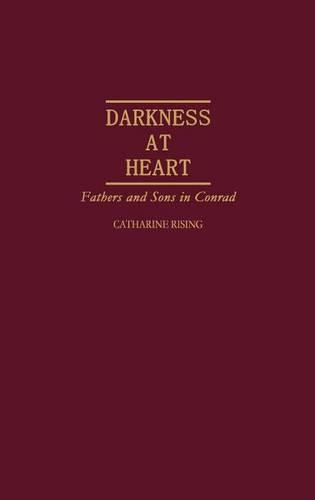
Darkness at Heart: Fathers and Sons in Conrad
(Hardback)
Publishing Details
Darkness at Heart: Fathers and Sons in Conrad
By (Author) Catherine Rising
Bloomsbury Publishing PLC
Praeger Publishers Inc
10th April 1990
United States
Classifications
Tertiary Education
Non Fiction
Literary studies: c 1900 to c 2000
823.912
Physical Properties
Hardback
224
Description
Although the fiction of Joseph Conrad has been studied extensively from a psychological perspective, a major theme seemingly neglected is that of ambivalence in the relations between fathers and sons. This volume contains Rising's Freudian and post-Freudian analysis of father/son interactions, at either the family or the social level, in Conrad's work. Defining the father as any older male with power and influence over a younger one, Rising examines wide thematic variations that show Conrad's obsessive concern with paternity - as an object either of fear and hatred or of longing - and in turn addresses the theme of Conrad's most successful fiction: the protagonist's struggle to find (or keep) his place in a world of men. In his fiction, Conrad uses an array of fathers and paternal types to achieve a constantly shifting perspective on filial relationships. In a panorama of actual or potential conflict, the author provides portraits of Conrad's father and son, and shows what chance of accommodation he offers. In chapters on the prototype of the father, the jeopardy of the son on land, and the immunity of the son at sea, the book discusses Conrad's use of an Oedipal compromise, a solution he abandoned in later works. Ultimately, although he appears to have sought new avenues of reconciliation in his last novels, the author demonstrates that the father/son antagonism is never fully resolved in his fiction.
Reviews
This study, notable for its clarity and incisive analysis, demonstrates the central importance of Oedipal rivalry in the father-son relationships that dominate Conrad's fiction, from his first novel, Almayer's Folly, to his final, unfinished novel, Suspense. Also exemplary is the intelligent application of psychoanalytic theory in the criticism of the fiction. Keeping Conrad's works always in the foreground, the author shows how interpretation of character and action in the light of Freudian concepts, such as displacement, repressed affect, and the superego, reveals controlling themes and patterns in Conrad's fiction--e.g., sexual and professional rivalries resulting in the mutual betrayal' of father and son figures; the survival of ascetic celibates, such as Marlow; the incestuous attachment of fathers to daughters whose suitors threaten paternal authority. In extended analyses of 16 novels and novellas, comparisons of the multiple father-son relationships developed within each work illuminate some of Conrad's most problematic scenes and characters. The clearly worded definitions of psychoanalytic concepts make the book accessible to the general reader as well as the specialist. The study builds on the earlier psychoanalytic criticism of Frederick Crews, Joseph Dobrinsky, and others, but its comprehensive treatment of Conrad's primary subject makes it a valuable contribution to Conrad criticism.-Choice
"This study, notable for its clarity and incisive analysis, demonstrates the central importance of Oedipal rivalry in the father-son relationships that dominate Conrad's fiction, from his first novel, Almayer's Folly, to his final, unfinished novel, Suspense. Also exemplary is the intelligent application of psychoanalytic theory in the criticism of the fiction. Keeping Conrad's works always in the foreground, the author shows how interpretation of character and action in the light of Freudian concepts, such as displacement, repressed affect, and the superego, reveals controlling themes and patterns in Conrad's fiction--e.g., sexual and professional rivalries resulting in the mutual betrayal' of father and son figures; the survival of ascetic celibates, such as Marlow; the incestuous attachment of fathers to daughters whose suitors threaten paternal authority. In extended analyses of 16 novels and novellas, comparisons of the multiple father-son relationships developed within each work illuminate some of Conrad's most problematic scenes and characters. The clearly worded definitions of psychoanalytic concepts make the book accessible to the general reader as well as the specialist. The study builds on the earlier psychoanalytic criticism of Frederick Crews, Joseph Dobrinsky, and others, but its comprehensive treatment of Conrad's primary subject makes it a valuable contribution to Conrad criticism."-Choice
Author Bio
CATHARINE RISING is an independent scholar whose major concentration is literature and psychology. She has written for Conradiana and is working on an interpretation of Conrad's major fiction from the standpoint of Kohut's self psychology.
